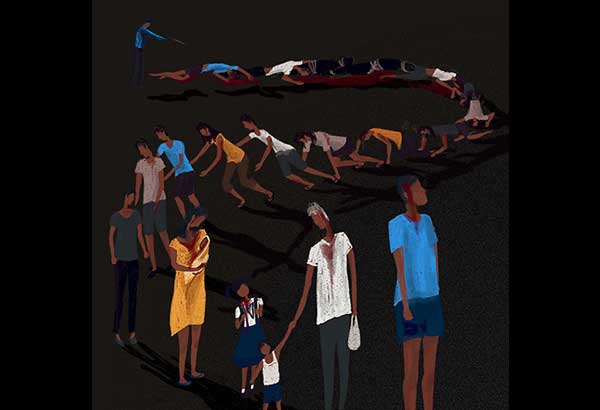Flash fiction: Collateral damage

Illustration by PATRICIA SAN LUIS
Disclaimer: This work is a short fictional story. All characters appearing are fictitious. Any resemblance to real persons, living or dead, is purely coincidental]
The slums are calling me back. Looban — it’s no different from a prison.
When I entered college, I bid goodbye to that place. The next four years were easy, even the everyday commute from Binangonan to Pureza didn’t hurt. If any, my time on the jeep, on the train, and on the pedicab to PUP, only strengthened my resolve to leave our ramshackle house in Rizal. The farther I was from home, the clearer my thoughts became.
We had no real address. If you needed me, you’d only have to come around the corner, ask the bystanders where the Velascos lived, and they’d point you to where we were. We moved five times, all in the same area. Sometimes we moved because we could no longer afford the rent. Sometimes we moved because it flooded for days inside the house. Twice, we moved because a family member had relocated to his wife’s house and, to save money, we’d rent a smaller space. Once, we transferred because one of my brothers had died, and my mother blamed it on the drains near the house which, according to her, nursed the dengue mosquitoes which fed on my brother.
Our area is what many call “urban poor.” It’s strange because many of those I met in Manila considered Binangonan rural and imagined we were living in houses made of nipa and bamboo. “Binangonan sounds like some distant country,” a girl I was dating joked, “like, is it even in Luzon?” I got used to it. Outside “North” and “South”, there are many things Manileños are clueless about, although many of them act like they know more than everyone else.
The rampant drug problem in our area is the biggest reason why I found myself relieved? — I don’t know — when I finally became an engineer. Nobody I knew believed that anyone from our area was fated to become one. Even I didn’t believe in myself sometimes. I’m a man of little faith but I consider it no less than a miracle when I passed the board exams.
On the evening when I took my oath as a professional, my father — who wasn’t there at the ceremonies — called me up and asked me to take the remaining hours in his 24-hour shift. It was almost sunrise and he was still driving the taxi he had been driving for years. I acted like I didn’t know that he was using a drug, not even an energy drink ‘cause those things melted the pancreas. I just took the wheel from him and dropped him off at the Ortigas Extension, his mind fried though he’d know his way home. He was my father anyway, a great man, and I owed him everything.
The boys I grew up with are now all involved in the “Drug War,” one way or another. Many of them are users, some of them are peddlers. Some of them are cops and a few of them are barangay officials who work for the government as liaisons, staffers, clerks, foot soldiers, etc. Sometimes, we’d find ourselves playing basketball on the same covered court we’d been playing in since we were kids. We joked about it a lot, though it’s probably more real to us than it is to most. Whenever someone committed a foul, the cops among us would joke, “Isa ka na lang, pa-tokhang na kita.” To which some would reply, “Ulul? Magkano bentahan sa na-raid niyo kahapon?” This “War on Drugs” has been lost on us since day one.
It seems that these things had a system, too. One by one, pushers and users in our town were shot. And once in a while, a cop would take his turn and bite the dust. When my friend, Jan, was shot, we didn’t doubt the fact that he sold drugs. But when his younger brother was shot, we knew it was mere bloodlust. Their youngest, Tonyo, 18, vowed revenge to shoot the cop who shot Jan. But before he could, the cop was shot at the back of his head at a raid against unarmed peddlers. A fellow officer had shot him down, and it was made to appear that a druggie did it — the cops were all in on it.
Tonyo is now a peddler, a rank he “inherited” from Jan. He confessed to us that Jan’s old bosses had left him with no choice. Either he takes the position Jan left vacant or he suffers the same fate as his brothers. It wasn’t difficult to kill someone, not with all that money being tossed around, and the business had to go on.
I’ve seen their plan unfold. It has taken the lives of the people I grew up with. I’ve made a map in my head and I’ve traced where this will all boil down: it feels like what they are planning is a systematic killing of our kind, like they’ve made murder a policy.
For so long, I’ve wanted a way out of the place I grew up in… and I made it out. But now it’s calling me back. Pretty soon, there’ll be no one left to kill in my hometown. Pretty soon, they’ll come for my father. Then they’ll come for me.















